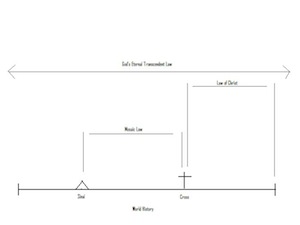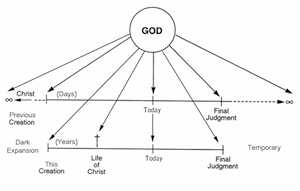Deasy responds to Stephen's bleak view of history with
quintessential Victorian optimism: "All human history moves
toward one great goal, the manifestation of God." Taking his
assertion more or less seriously, Stephen answers that if God
is in the business of manifesting himself in human history
then even the basest things must be divine.
Thornton identifies two close analogues to Deasy's statement:
Alfred, Lord Tennyson's hopeful vision of "one far-off divine
event, / To which the whole creation moves," at the end of In
Memoriam (1850), and Matthew Arnold's lines from Westminster
Abbey (1881), "For this and that way swings / The flux
of mortal things, / Though moving inly to one far-set goal."
Gifford observes that by the end of the 19th century such
"faith in the inevitability of man's moral and spiritual
progress...was widely regarded as a feeble substitute for
vital spiritual commitment."
The idea that history has a telos or purposeful
end-point had long been associated in western culture with the
historiography of the Christian church, whose ideas of
apocalypse, judgment, and revelation Joyce contrives to
associate, derisively, with the "goal" being
scored on the hockey field. The Christian conception of
history is marked by a beginning (the Creation), a middle (the
Incarnation), and an end (the Last Judgment). Although God
exists outside of time, he reveals his providential plan in
such linear developments, and so history can be seen as the
ongoing record of his self-manifestation, with the fullest
revelation coming at the end of time. Some secular western
historiographies, such as Hegel's description of human history
as a progressively greater manifestation of Geist or
Spirit, have drawn on this Christian model, and in 19th
century Britain the swelling tide of industry, science,
empire, and commerce encouraged a new belief in "progress."
Against such schemes depicting history as a linear
progression, Joyce seems to have preferred circular or
cyclical models which describe human experience perpetually
revisiting similar states of being, with no clear beginning or
end. The early lecture "Drama and Life" (1900) describes
eternal human truths that express themselves perpetually and
unchangingly in human experience. The Viconian historiography
of Finnegans Wake augments this eternal sameness
with the idea of recurring cycles.
In Proteus, Stephen continues thinking about ideas
of history. He harshly dismisses the triumphant
transcendentalism of Deasy's "one great goal" when he watches
a live dog sniffing a dead one on the tidal flats: "Dogskull,
dogsniff, eyes on the ground, moves to one great goal.
Ah, poor dogsbody! Here lies poor dogsbody's body."
Here, the great goal of life is clearly death. When Stephen
contemplates the decomposing body of the drowned man at the
end of Proteus, it becomes apparent that his focus
on the death of the organic body does not represent simply a
cynical or nihilistic rejection
of metaphysical explanations; but it does constitute a
rejection of Christian metaphysics.


